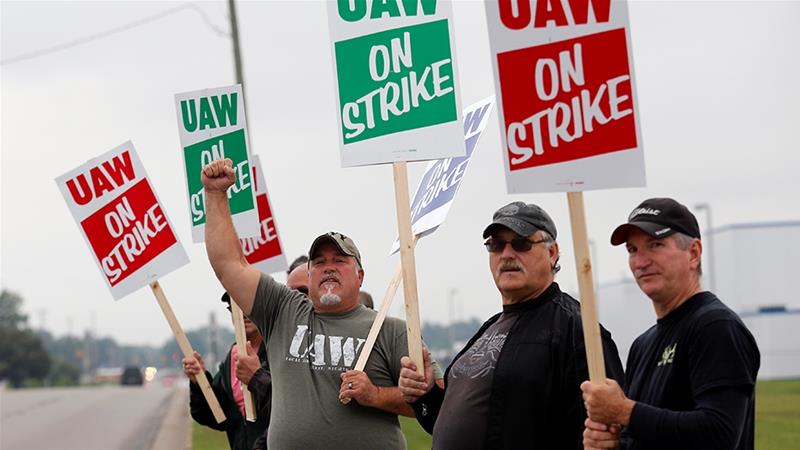The GM Strike Rolls On

The UAW’s strike against General Motors continues with no end in sight. This has made me briefly relevant, so here are a few thoughts. First, something that has nothing to do with me. The great labor historian Nelson Lichtenstein tweeted this out:
This is the moment the Bernie campaign should urge its own supporters and many, many others to join UAW picket lines and stop non union middle management and others from entering GM plant offices. We need to rewrite the labor law – in the streets. https://t.co/jI8OYua5y5
— Nelson Lichtenstein (@NelsonLichtens1) September 17, 2019
The only thing I disagree with here is that it should be limited to something Sanders does. Any Democrat who supports unions should be asking their supporters to do something here. The word “solidarity” is something that people like to throw around, but it requires actually doing something to implement. And this is something that people should do. If some candidate–any, really–actually asked its supporters to do this, it would be quite a challenge thrown out to other candidates. Moreover, getting a lot of people in the streets would make a difference. I am of course pretty skeptical of the overheated arguments of Bernie’s online supporters, but I do think the people most likely to do this would be these people. Given that Warren supporters do trend toward the middle-class and educated classes, fewer might be comfortable. But whatever, she should demand this anyway. And while the legality perhaps gets a little more dicey here, Lichtenstein’s suggestion certainly can be expanded to GM dealerships, at least with informational pickets. Getting the dealers to put pressure on the company could not hurt, even if their wouldn’t want to per se and would probably be more angry at the protestors than GM. In any case, in a nation where actually secondary boycotts are largely illegal–only Teamsters contracts protect them specifically from moving products from companies on strike as far as I know–we need more inventive tactics. This is a good one.
One thing about strikes like this is that they are often over issues where most American workers have often completely lost a right or a benefit and unions are trying to hold on from losing it too. That’s definitely the case with this strike, as the UAW is fighting to hold the line on health care. Right now, UAW contracts only require employees to pay about 3% of their insurance costs. GM badly wants to change that. But the entire idea of employee contributions is something that only extends back to the 1980s. I talked to Rachel Cohen about this and it led to her writing this great piece for Vice about it:
“Having to pay large amounts of your health-care, that is still a fairly recent phenomenon,” said Erik Loomis, a labor historian at the University of Rhode Island and author of A History of America in Ten Strikes.
Loomis pointed to a 1983 labor stoppage where thousands of copper miners and mill workers went on strike for almost three years against the Arizona-based Phelps Dodge Corporation. “One of the key issues of that strike was that workers were so outraged by the request that they pay part of their health care,” he explained. “It was unprecedented, and yet today it’s become so normalized. Everyone complains about it, but employers just slowly force more and more of their costs onto their workers.”
Rather than ask why UAW workers pay so little in healthcare costs relative to others, Loomis said, the conversation should be framed around “workers defending what they have, and not letting companies cede more and more of their responsibility.”
Employer-based health insurance was actually something of a historical accident in the United States, led partly by labor unions that were barred from negotiating over wages during World War II. That led unions to begin focusing on other types of permissible fringe benefits, including employer-sponsored insurance. Many non-union companies followed suit, facing pressure to compete with unionized firms. Subsequent changes to the federal tax code made offering health insurance even more attractive for employers, so much so that 70 percent of the population was covered by private health insurance in the 1960s, up from nine percent in 1940.
Today, of course, when “job hopping” is common and the so-called gig economy means many workers are not full-time employees, it’s become painfully evident that tying health insurance to work is less than ideal.
That’s for sure. Completely disconnecting health care from employment should be a top goal for all of is and already is for many of us.
I’ve also been on NPR shows a couple of times, which was new for me. Maybe with Cokie gone, there’s space for me! I was on Marketplace Morning Report, extremely briefly, yesterday. And then today I was on Morning Edition, for somewhat longer in what is a pretty good story on the strike. I was also on The Rick Smith Show on Tuesday for a lengthy interview about it. So check all of that out if you dare.


